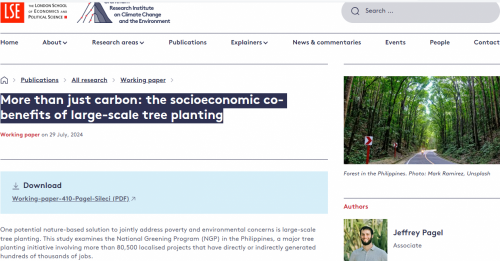Jeffrey Pagel
Associate

https://www.lse.ac.uk/granthaminstitute/publication/more-than-just-carbo...
Associate
Research Officer
One potential nature-based solution to jointly address poverty and environmental concerns is large-scale tree planting. This study examines the National Greening Program (NGP) in the Philippines, a major tree planting initiative involving more than 80,500 localised projects that have directly or indirectly generated hundreds of thousands of jobs.
The authors find a significant and sizable reduction in poverty as a result of the initiative, measured via traditional and remotely sensed indicators. The NGP has also spurred structural shifts, notably decreasing agricultural employment while boosting unskilled labour and service sector jobs. In terms of climate change mitigation, the analysis estimates that the NGP sequestered 71.4 to 303 million tonnes of CO2 over a decade.
These findings underscore the potential of tree planting as a dual-purpose strategy for climate mitigation and poverty alleviation.
The idea is simple: creating an open “Portal” where engaged and committed citizens who feel to share their ideas and offer their opinions on development related issues have the opportunity to do...
Please fell free to contact us. We appreciate your feedback and look forward to hearing from you.
Empowered by ENGAGE,
Toward the Volunteering Inspired Society.